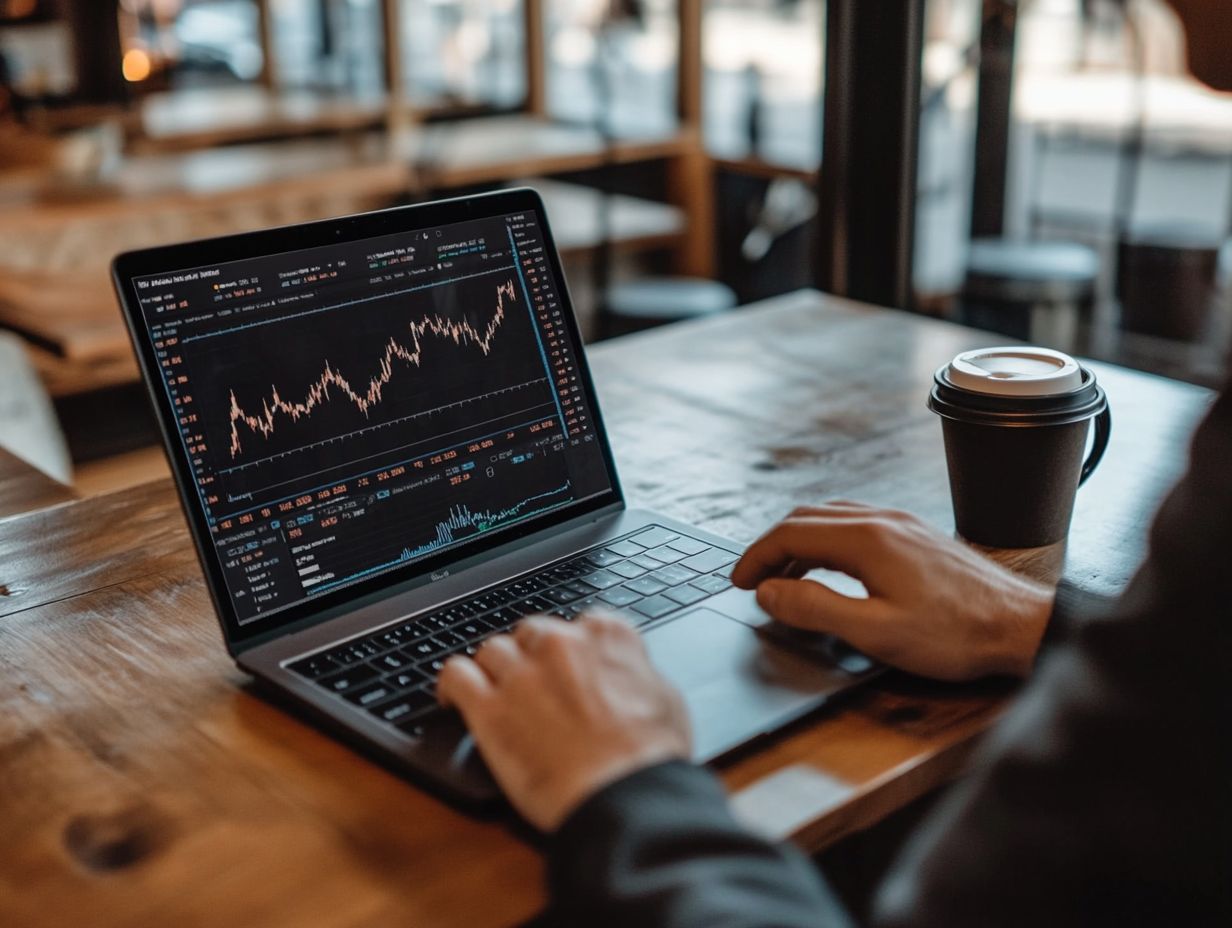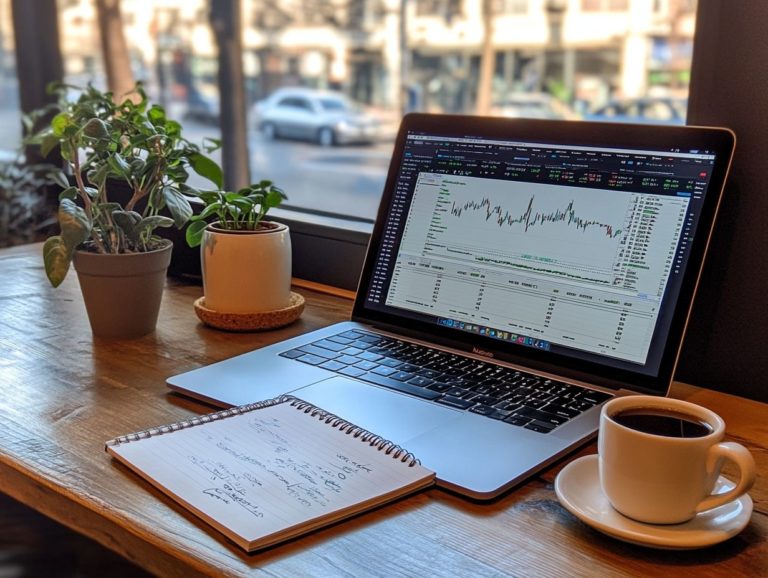How to Handle Criticism in Trading
Criticism is an unavoidable aspect of trading, and grasping its nuances can profoundly shape your trading journey.
This article examines the various types of criticism you may encounter and explores their emotional and psychological effects on you as a trader. It offers practical strategies for managing criticism, guiding you in cultivating a resilient mindset and seeking constructive feedback. Get ready to turn criticism into a powerful tool for your growth!
It emphasizes the value of a supportive trading community and the importance of building a network of mentors and peers.
Contents
- Key Takeaways:
- Understanding Criticism in Trading
- The Impact of Criticism on Traders
- Ways to Handle Criticism in Trading
- Creating a Support System
- Frequently Asked Questions
- How can I handle criticism in trading effectively?
- How can I handle criticism in trading without letting it affect my emotions?
- How can handling criticism in trading help me improve my performance?
- What are some common mistakes traders make when handling criticism?
- How can I use criticism to my advantage as a trader?
Key Takeaways:

- Take criticism as an opportunity to improve your trading skills and performance.
- Develop a resilient mindset to handle criticism and use it to your advantage.
- Surround yourself with a supportive trading community and seek constructive feedback from mentors and peers.
Understanding Criticism in Trading
Understanding criticism in trading is essential for novice traders, as it can profoundly impact their trading behaviors and skill development. Feedback from mentors, coaches, and even fellow community members can become invaluable, giving you the power to navigate criticism with grace during pivotal moments.
By mastering the emotional weight of criticism, you can learn from your missteps whether it’s acknowledging losing trades or managing risks in high-stakes scenarios. Embracing feedback can transform criticism into a productive feedback loop, ultimately refining your decision-making process and enhancing your trading prowess.
Types of Criticism in Trading
Types of criticism in trading encompass both public dissent and the subtle voices of critique, which can profoundly influence your confidence and performance.
When you’re a novice trader facing public scrutiny be it negative comments from peers or harsh evaluations on trading platforms it can chip away at your self-esteem and elevate your anxiety. This heightened stress can cloud your judgment, ultimately impairing your decision-making abilities.
Conversely, constructive feedback from a more experienced trader, especially regarding risk management strategies, can be a treasure trove of insights, sharpening your trading skills. Imagine receiving constructive criticism about your stop-loss placement (the price point at which a trader exits a losing trade to minimize losses); that invaluable guidance could help you refine your technique and protect you from big losses in future trades.
However, it s crucial to recognize that destructive criticism often harsh and unhelpful can lead you to second-guess your strategies. This self-doubt may result in missed opportunities and hinder your growth as a trader.
The Impact of Criticism on Traders
The influence of criticism on traders can go well beyond immediate emotional and psychological effects; it can significantly affect their overall trading success and mental well-being.
For novice traders, the fear of negative feedback can deter them from making trades or accepting constructive criticism. This often results in a cycle of feeling unsure and stuck, stifling your growth and potential as a trader.
Emotional and Psychological Effects

The emotional and psychological effects of criticism can significantly alter your trading behaviors, often leading you to either withdraw from the market or double down on your efforts.
When faced with negative feedback, it s natural to feel a wave of anxiety wash over you, prompting you to second-guess your decisions or trade less frequently. This heightened defensiveness often arises from a fear of failure, which may cause you to react impulsively instead of strategically. Some traders view criticism as a chance for growth.
To navigate these emotional challenges, it s essential to cultivate a mindset that embraces mistakes as stepping stones to improvement. Techniques such as keeping a reflective journal, seeking constructive advice from mentors, and practicing mindfulness can help you transform criticism into invaluable learning experiences.
Ways to Handle Criticism in Trading
Handling criticism in trading is crucial for your personal growth and ongoing improvement. By employing effective techniques for managing criticism, you can transform potentially harmful feedback into a constructive feedback loop that fosters your development.
Developing a Resilient Mindset
Developing a resilient mindset is essential for you as a novice trader. It enables you to navigate the emotional landscape of criticism and trading decisions with confidence. This foundational skill empowers you to transform setbacks into valuable learning opportunities, paving the way for long-term growth and success in your trading career.
Key components of resilience include heightened self-awareness, which allows you to identify your emotional triggers and responses. You also need to focus on managing your feelings, equipping you to handle stress and respond constructively in challenging situations. By embracing proactive learning, you ensure that you remain adaptable and continually refine your strategies.
Incorporating techniques such as journaling to track your progress, practicing mindfulness to regulate emotions, and engaging in simulated trading can significantly enhance your ability to bounce back from failures while keeping your focus firmly on your objectives.
Seeking Constructive Feedback
Seeking constructive feedback is invaluable for you as a novice trader. It offers insights from experienced trading coaches and community members.
By actively engaging with mentors and peers, you can gain diverse perspectives that broaden your understanding of market dynamics. This collaborative approach fosters your growth and cultivates resilience during challenges. Constructive criticism offers you tangible opportunities to identify areas you might overlook in your strategies, refine your decision-making processes, and enhance your risk management techniques.
As you embrace feedback, you’re likely to notice improvements in your overall performance. Ultimately, this accelerates your journey toward becoming a proficient and confident investor.
Using Criticism to Improve Performance

Embrace criticism as a powerful tool for improvement. Cultivating a mindset that views mistakes as valuable opportunities for learning and growth is vital.
As a trader aiming to elevate your skills, seeking feedback on your strategies and decisions can yield remarkable benefits. For example, by analyzing past trades and gathering insights from mentors or peers, you can identify areas for improvement that may have initially escaped your notice.
Successful leaders across various fields exemplify this practice. Consider a sports coach who, after a game, meticulously reviews team performance and encourages players to reflect on their choices.
Create an environment where constructive criticism is truly valued and watch your skills soar! You can adapt your methods, refine your techniques, and ultimately enhance your decision-making process. This, in turn, leads to more informed and confident trading activities.
Creating a Support System
Establish your support system now to skyrocket your trading potential! A support system is essential for novice traders, as it cultivates a nurturing trading community where you can share experiences, seek valuable advice, and collaboratively enhance your trading skills.
Importance of a Supportive Trading Community
Don t underestimate the power of a supportive trading community it can transform your journey! It plays a vital role in shaping your trading behaviors and emotional well-being as a novice trader.
Engaging with such a community provides myriad benefits. You experience shared learning experiences that expedite your skill development and gain the emotional support you need during challenging market conditions. Many traders find comfort in group discussions, where you can analyze market trends collectively, creating a rich reservoir of knowledge. The networking opportunities within these communities can lead to collaborations that enhance your trading strategies and bolster your confidence.
Initiatives like mentorship programs and collaborative trading sessions foster a sense of belonging. They empower you with the insights and support needed to navigate the often turbulent trading landscape.
Building a Network of Mentors and Peers
Building a network of mentors and peers is crucial for novice traders. It provides guidance and support on your trading journey.
Connecting with experienced professionals allows you to share insights. These relationships can last throughout your trading career.
Attending workshops on trading strategies enhances your experience. You can meet like-minded individuals who share your interests.
Joining trading forums lets you exchange ideas and receive helpful advice. Leverage social media to create visibility and engage daily with the trading community.
Having mentors keeps you accountable and encourages personal growth. You and your peers can share experiences and support each other through market challenges.
Frequently Asked Questions

How can I handle criticism in trading effectively?
- Understand that criticism is part of the learning process. It helps you identify areas for improvement.
- Develop a growth mindset. View criticism as an opportunity to learn, not a personal attack.
- Take a moment to process criticism before reacting. Reflect on your actions and make necessary adjustments.
- Seek feedback from multiple sources for a well-rounded perspective. This helps identify common areas for improvement.
- Remember that not all criticism is valid. Evaluate the source and their intentions before taking it to heart.
- Use constructive criticism to your advantage. Set specific goals and create an action plan to address areas needing improvement.
How can I handle criticism in trading without letting it affect my emotions?
- Take a step back and breathe before responding. This helps you remain calm and think rationally.
- Separate yourself from your trading decisions. View criticism as feedback on your actions, not a personal attack.
- Use positive self-talk to reinforce your confidence. Remember, criticism is not a reflection of your worth as a trader.
- Seek support from other traders or a mentor who can provide unbiased opinions and help you process criticism healthily.
- Focus on the facts rather than the emotions behind the criticism. This keeps you objective and encourages necessary changes.
- If needed, take a break from trading to clear your mind and return with a fresh perspective.
How can handling criticism in trading help me improve my performance?
- Embrace criticism! It can reveal blind spots in your trading strategy or mindset that may be hindering your performance.
- By addressing and learning from criticism, you can become more adaptable to changing market conditions.
- Criticism provides valuable insights from experienced traders, allowing you to learn from their mistakes and successes.
- Handling criticism effectively improves your emotional intelligence and resilience, crucial qualities for long-term success.
- When used constructively, criticism pushes you out of your comfort zone and encourages constant improvement.
- Receiving and managing criticism well can enhance your reputation and credibility as a trader, opening up growth opportunities.
What are some common mistakes traders make when handling criticism?
- Reacting impulsively and defensively without taking time to process the criticism.
- Taking criticism personally, allowing it to affect their emotions and confidence.
- Not seeking feedback from multiple sources, leading to a skewed perspective.
- Dismissing all criticism, even valid and helpful feedback.
- Focusing on the negative rather than using criticism as a learning opportunity.
- Neglecting to set specific goals and take action to address areas needing improvement highlighted by criticism.
Remember, handling criticism effectively is a vital skill that can significantly enhance your trading journey. Embrace it, learn from it, and watch your performance soar!
How can I use criticism to my advantage as a trader?
View criticism as a chance to learn, not a personal attack. Seek feedback from different sources to understand its validity and intent.
Use helpful feedback to find areas you might not see in your trading strategy or mindset. Create an action plan to improve and set specific goals to track your progress.
Push yourself out of your comfort zone to drive growth as a trader. Embrace criticism as a way to challenge yourself; it s a chance to grow and excel!
Remember, handling feedback well can boost your emotional intelligence and resilience. These qualities are vital for long-term success in trading!






